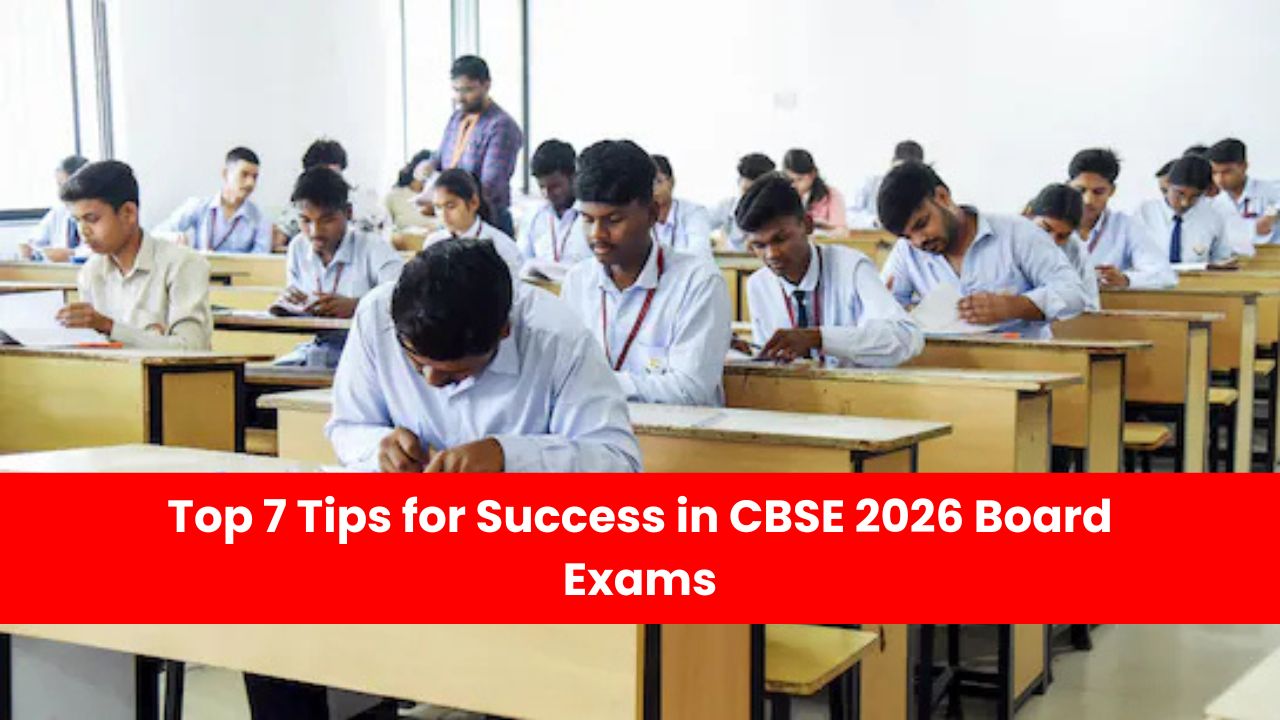Success in the CBSE 2026 Board Exams is a significant milestone that requires a strategic, well-informed approach. This guide provides seven proven t
Success in the CBSE 2026 Board Exams is a significant milestone that requires a strategic, well-informed approach. This guide provides seven proven tips to help Class 10th and 12th students prepare effectively, manage stress, and maximize their performance to achieve their academic goals.
Tip 1: The Blueprint to Brilliance: Know Your Syllabus & Exam Pattern
Before you begin, you must understand the latest exam format. CBSE has increased the weightage for competency-based questions to 50%, a substantial rise from the previous 40%. This means a shift from rote memorization to questions that test your ability to apply knowledge in real-world scenarios. Consequently, the weightage of traditional long and short-answer questions has been reduced to 30%. You should also master the subject-specific weightage, such as Calculus, which accounts for 35 out of 80 marks in Class 12 Mathematics . Knowing this breakdown helps you allocate your time efficiently.
The table below provides a concise overview of the updated marking scheme.
| Class | Subject | Total Marks | Theory Marks | Internal Assessment/Practical Marks | Question Typology Breakdown |
| Class 10th/12th | Maths | 100 | 80 | 20 | MCQs/Competency-Based: 50%, Descriptive (Short & Long): 50% |
| Class 10th/12th | Science | 100 | 80 | 20 | MCQs/Competency-Based: 50%, Descriptive (Short & Long): 50% |
| Class 12th | Physics, Chemistry, Biology | 100 | 70 | 30 | MCQs/Competency-Based: 50%, Descriptive (Short & Long): 50% |
| Class 12th | Commerce Subjects | 100 | 80 | 20 | MCQs/Competency-Based: 50%, Descriptive (Short & Long): 50% |
Tip 2: Your Time, Your Triumph: Craft a Smart Study Plan
A strategic, well-structured study plan is crucial to avoid feeling overwhelmed and to combat procrastination. Adopt the 3:2:1 Strategy to prioritize subjects by dedicating 3 hours to your toughest subjects, 2 hours to moderately difficult ones, and 1 hour to easier, revision-based subjects . Use the Pomodoro Technique—studying for 25-30 minutes followed by a short 5-minute break—to prevent mental fatigue and maintain concentration during long study sessions .
Tip 3: Befriend the NCERT: The Foundation of Your Success
NCERT textbooks are the single most important resource, as the core of all exam questions comes directly from them . Read them thoroughly, line by line, and diligently solve all the in-text and end-of-chapter questions . Go beyond passive reading by creating smart notes with bullet points, diagrams, and flowcharts. This active learning approach reinforces concepts and helps you apply them, which is essential for the new exam pattern .
Tip 4: Practice Makes Perfect: Mock Tests & PYQs are Your Best Friends
Once your foundational knowledge is solid, practice is key. Simulating the real exam experience by solving previous years’ question papers (PYQs) and mock tests is crucial for building confidence and mastering time management. The CBSE often repeats question patterns and concepts . After each practice test, immediately review your mistakes to identify weak areas and transform your practice into a targeted learning opportunity .
Tip 5: Ace the Last-Minute: Your Final Countdown Strategy
The final days are for strategic revision, not for learning new topics . Utilize the 60-30-10 Rule in the last week: spend 60% of your time on your weakest areas, 30% on moderately difficult topics, and 10% on reviewing your strengths . The day before the exam, avoid cramming; instead, review your short notes, organize your stationery, and ensure you get 7-8 hours of sleep for memory consolidation .
Tip 6: Mind Your Health: A Balanced Body, A Sharp Mind
Your physical and mental well-being are non-negotiable for success. Prioritize sleep (7-8 hours per night) for better memory and concentration, and maintain a healthy diet to provide your brain with the energy it needs . Manage exam stress with simple activities like deep breathing exercises, a short walk, or listening to music . Most importantly, avoid comparing your progress to that of others, as this often leads to unnecessary anxiety .
Tip 7: Write to Score: Presentation & Clarity Matter
While content is paramount, presenting your answers clearly can significantly impact your score. Write concise, to-the-point answers and avoid unnecessary information. In descriptive subjects, use diagrams and flowcharts, and underline key terms and phrases to make your answers easy for the examiner to read and understand . This simple practice improves both clarity and your final score.
Conclusion
Success in the CBSE 2026 Board Exams is a marathon, not a sprint. By understanding the new exam pattern, creating a smart study schedule, focusing on NCERT, and prioritizing your health, you can build a confident and strategic approach to your exams. Follow these tips to turn your hard work into brilliant results.
FAQs (Frequently Asked Questions)
Will marks be deducted for spelling mistakes in non-language papers?
Marks are deducted for spelling mistakes and other errors in language papers (Hindi/English). In other subjects, it is generally less strict, but a clear and legible answer is still important for easy evaluation.
Is it mandatory to pass in theory and practical exams separately in Class 12?
Yes, a candidate must secure a minimum of 33% marks in both the theory and practical components of a subject to be declared pass.
Can I use a gel pen in the board exams?
Yes, you can use a blue or royal blue ink gel pen. However, the use of whitener is strictly prohibited.
Will I get marks for a good presentation or neat handwriting?
While no separate marks are explicitly allotted for presentation, a neat and well-organized answer with underlined key points and diagrams makes it easier for the examiner to evaluate, which can work in a student’s favor.
Are questions repeated in the CBSE Board Exams?
Yes, previous years’ question papers are an excellent resource for exam preparation, as CBSE frequently repeats question patterns and concepts.


COMMENTS